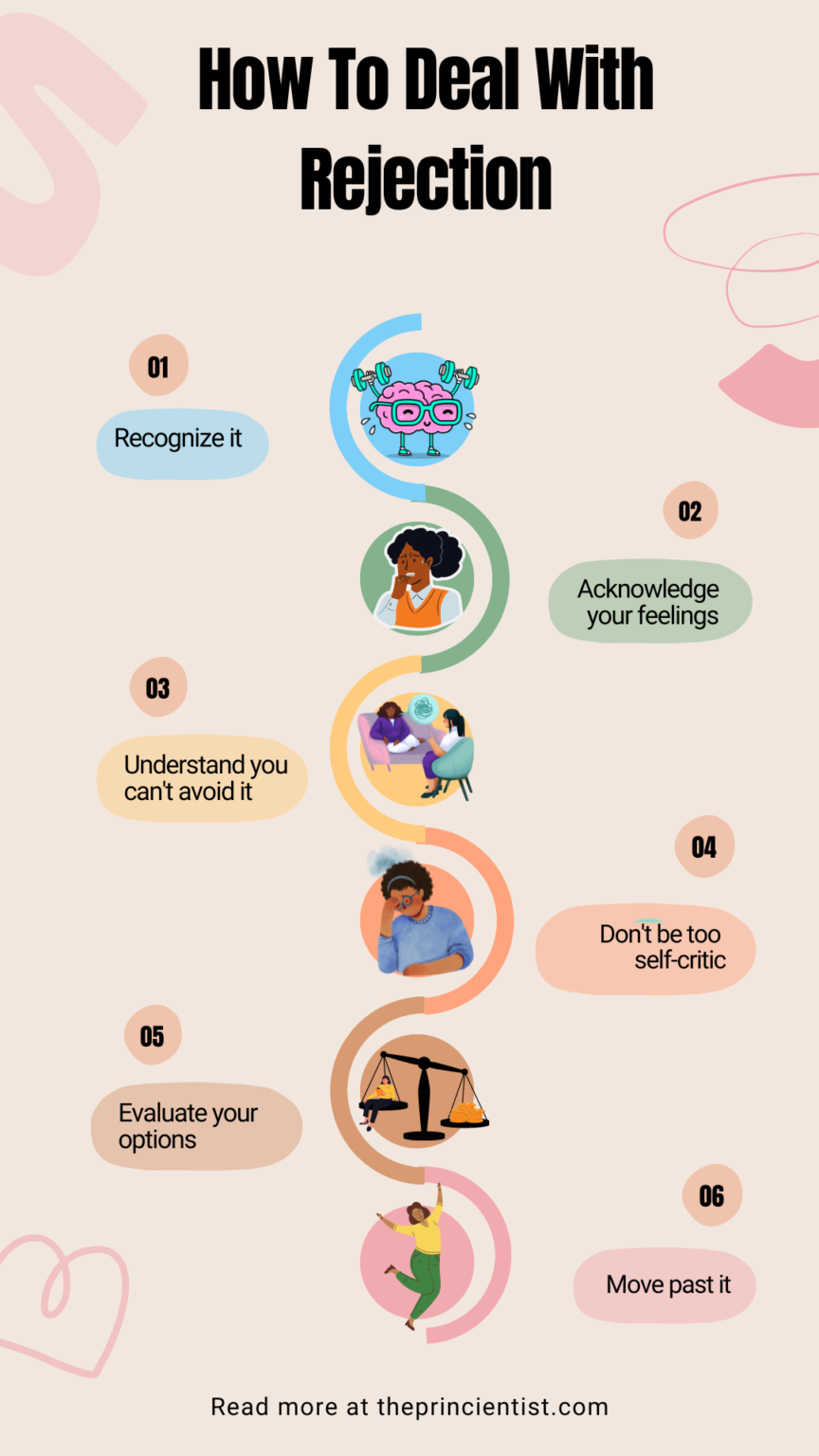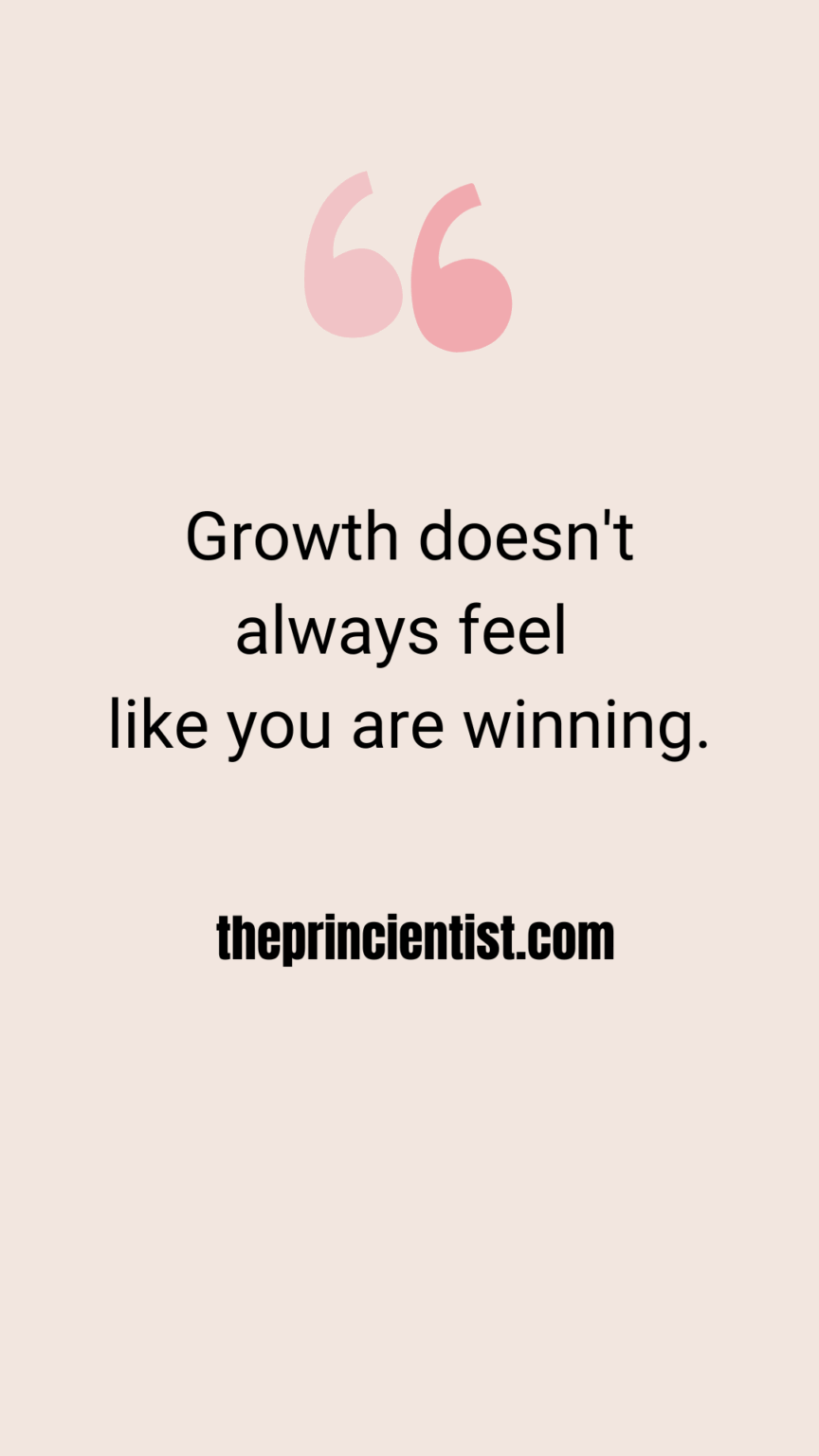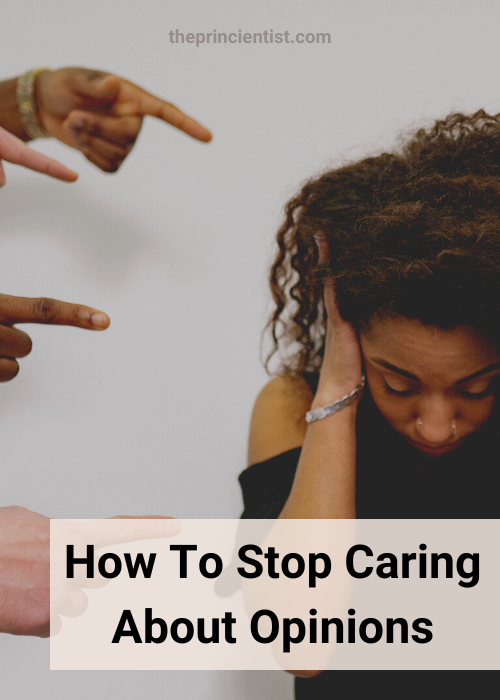Last updated on September 26th, 2025 at 12:29 am
Why does getting rejected hurt so much?
This post will teach you how to deal with rejection.
Although rejection doesn’t mean you are not wanted, valued, or accepted, it can feel like you have failed yourself and the expectations of others.
It becomes hard to understand that rejection and setbacks are necessary for growth, because it does not bring good feelings.
For instance, I’m sure you have heard inspirational stories about how jobs or dates rejected successful people.
And how they handled it so well and without losing composure.
Eventually, it’s your turn, and all you have to show for is tears and anxiety.
Now it’s time to learn how to deal with rejection.
Let’s get started.
Rejection activates the same areas in your brain that physical pain does.
The pain can deeply impact self-worth and self-confidence.
Over time, as you gain tolerance to rejection, it stops feeling painful.
And when you change your mindset and see it as an opportunity to improve yourself.
Sometimes a rejection is a harsh reality check.
However, if you approach it correctly, it can be a redirection toward something else that is a perfect fit for you.
To think in this way, you need to reframe your point of view.
You can use scientific theories to put things in perspective.
Learn how to deal with rejection from enzymes.
How to deal with rejection – a change in perspective with science
Enzymes are small proteins that mediate chemical reactions in your body.
They are biocatalysts, which means they are shortcuts to achieve better results in a shorter amount of time.
One of the criteria to determine whether an enzyme is good or not is selectivity.
Selectivity is the enzyme’s ability to perform the desired reaction instead of another one, which is also possible.
Enzymes work by binding to a molecule called a substrate.
The substrate connects to the enzyme and initiates the chemical reaction.
Other subtracts, despite being just as possible to connect, are rejected.
Why?
Due to selectivity.
Because enzymes are very selective, no matter how many substrates try to bind to them, they very quickly realise that they can’t bind themselves as they are not the best fit.
So, what do these substrates do?
They connect with another enzyme that they are fit for.
How does this apply to life?
Look at enzymes as opportunities that will allow you to achieve your goals faster.
And you as the substrate.
Then selectivity is the ability to choose what you prefer instead of other things, which are also possible for you.
You can only bind to an opportunity if you are a good fit.
If you discover you don’t fit an opportunity, other opportunities are available to you and are just as possible to achieve.
This is a law of nature.
For example, many molecules in your body only function if they have the right receptors.
Similarly, plants can only grow in the proper environment.
And animals cannot live outside their habitat for long.
Although there is no such thing as a perfect fit, finding the place where you don’t belong now will lead to a chain of reactions that will lead your life to a much better place.
Your body innately understands this perspective, so you can too.
Instead of feeling bad about yourself, accept your current reality as soon as possible and prepare for the next path in front of you.
Now, let’s get more specific on how to achieve that below.
Navigate Rejection – step-by-step (results may vary)
1. Recognize it
First, understand that you have been rejected.
It is okay to try to negotiate or find common ground.
But at the end of the day, you have to learn how to take a no for an answer.
Not every situation is up for debate.
If the other party expressed discomfort or fear, step away.
2. Acknowledge the byproducts of rejection
Rejection on its own is not bad.
It teaches restraint, impulse control and that we can’t always get what we want.
But the aftermath of rejection, if not handled well, is an issue.
If you have been rejected a lot, you internalise the negative judgment and believe bad things about yourself.
Rejection brings feelings like fear, hurt, anxiety, jealousy, and vulnerability.
In some cases, it can even be paralysing.
In the Western world, it is common to perceive the above emotions as negative or inconvenient.
You need to understand that these emotions are not inherently bad.
You are the one who gives the emotions their meaning.
Although it is not easy, you need to acknowledge these feelings.
The only way out is through, so give what you are feeling a name so you can process it healthily.
If you are sad or angry, there is no need to pretend you are okay.
If you can’t recognise what you are feeling, use the feelings wheel to identify emotions correctly.
This is important.
When you accurately express your feelings, you can emotionally regulate and get the support you need.
For example, feeling sad does not require the same support, and it will not ignite the same reaction as feeling humiliated.
Once you know what you are feeling, it will help you navigate different emotions and even help you recognise your triggers.
3. Understand rejection is part of life
Everyone has been rejected.
In fact, billions of people before you have been rejected.
For the same reasons, you are being rejected now.
Even someone you admire has probably faced rejection before.
You are not alone.
Talk to a friend or a mentor about your experience and share what you are feeling.
A good conversation can make you feel less isolated and put things in perspective once you realise it is not something that is happening to you exclusively.
Realistically, you will probably be rejected again.
So it is very important to understand that rejection is not usually personal.
And is not a reflection of your success in life.
Don’t tie your self-esteem and worth to something you have no control over, and it is very subjective, like rejection.
Otherwise, it will bring bad results in the long term.
Rejection is external to you.
4. Don’t be too self-critic
After someone rejects you, it is easy to become self-critical.
For instance, the response can range from name-calling to doubting your ability and even to a sense of inadequacy.
These behaviours further damage your self-esteem.
To change your perspective on rejection, you need to be intentional about the way you think about it.
– Remove negative thoughts
Avoid thinking that your current path is the worst thing that could happen to you.
It is not.
It is a different outcome from what you planned, but a redirection toward something different.
This is also a good time to avoid comparisons.
You can learn how to deal with rejection in a better way by adopting coping mechanisms to avoid unhealthy responses.
Learn how to self-soothe your emotional pain.
5. Evaluate your options
You are not helpless before adversity.
You can grow and evolve.
Therefore, after someone rejects you, you have options.
If possible, and if you have the resources and the chance, try again with more information, qualifications, or experience.
If you don’t, take it as a learning experience.
You can take rejection as feedback regarding what you need to improve on.
Or as an indicator to understand the direction you should be go toward.
At the end of the day, this path is not the only path to achieve the result you seek.
– Choose purpose over a default career
Focus on passion and purpose.
Separate your passion from the job title.
Instead of that, think about other ways to do what you want.
For example.
If you want to teach people a topic you are proficient in, you can earn a college degree and become a professor.
Alternatively, you can also create an online course or even become a mentor to someone with less experience.
There are many ways to achieve the desired result, so take a second to evaluate what you have and what you can do with it.
Find an identity in yourself, instead of a job title, relationship or opportunity.
You can still explore your passion without the specific role, but in another format.
6. Move past it
Rejection is not failure.
Unlearn that.
You have not failed.
Your circumstances have changed.
When circumstances change and interfere with your goal, don’t get sidetracked.
Go back on course by fitting your goal to your new reality.
The goals need to change to fit your reality, not the other way around.
Accordingly, set a new path to success.
Although the trial and error process in striving for your goal has led you in a direction you wouldn’t have originally thought of.
You will still be successful if you learn to be flexible enough to grow and change as your goals grow and change.
Remember, a plan is a theoretical version of reality you created and should be treated as such.
It can and should be adjusted according to different life circumstances.
You are stronger now.
Focus on what you do have instead of being caught up in what it could have been.
Make a list of the resources you have and work with that.
Your life is literally what you make of it.
Get better than what you planned
Ultimately, one of the most effective ways to move past rejection is to find a better opportunity than the one that rejected you.
You will be less likely to regret being rejected.
For example, try to find a job with more benefits, a school with a better program, a lover you can communicate better with…
Disclaimer: The above is not intended as a substitute for medical advice, diagnosis, or treatment. I am not a board-certified psychologist.
Pin it 📌

Final Thoughts
It is not easy to learn how to deal with rejection.
It requires mental work and practice.
But the better you get at dealing with rejection, the higher your tolerance for it.
Ultimately, you will recognise it as a part of your growth.
And that’s the secret.
The more you get rejected, the less it will hurt.
The hardest part is to face the judgment and opinions of others, which leads you to feel ridiculed and exposed.
Keep reminding yourself of your worth, and do not attach your self-worth to anything else who isn’t you.
The way people see you does not diminish your value.
But if you need help learning how to stop caring what others think of you, read the post below.
This method allows you to reevaluate unsolicited opinions in your life that are holding you back or stopping you from being your most authentic self.
Disclaimer: This article is informational only. This article does not provide medical advice, diagnosis, or treatment. Any information published on this website or by this brand is not intended as a substitute for medical advice, and you should not take any action before consulting with a healthcare professional. If you have questions or concerns about mental health, you should make an appointment to see a board-certified psychologist.
You Might Be Interested In
These songs change the narrative on stereotypes. The lyrics evoke self-confidence and self-care and encourage leadership and independence.
10 free things you can do for self-improvement to get started on your dream life today.
These books are filled with ideas that can have a positive effect on your life. The way to expand is to acquire new information and books provide just that.








